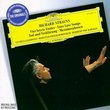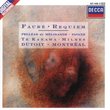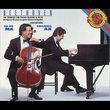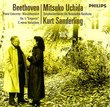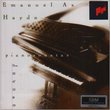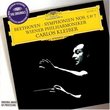| All Artists: Korzhev Title: Ernst Krenek: Piano Sonatas Nos. 2 & 4; George Washington Variations; Echoes from Austria Members Wishing: 0 Total Copies: 0 Label: Phoenix Edition Original Release Date: 1/1/2008 Re-Release Date: 8/26/2008 Genre: Classical Styles: Chamber Music, Forms & Genres, Sonatas, Suites, Historical Periods, Classical (c.1770-1830), Modern, 20th, & 21st Century Number of Discs: 1 SwapaCD Credits: 1 UPC: 811691011295 |
Search - Korzhev :: Ernst Krenek: Piano Sonatas Nos. 2 & 4; George Washington Variations; Echoes from Austria
 | Korzhev Ernst Krenek: Piano Sonatas Nos. 2 & 4; George Washington Variations; Echoes from Austria Genre: Classical |
Larger Image |
CD DetailsSimilarly Requested CDs
|
CD ReviewsThe art of the solo piano Dean R. Brierly | Studio City, CA | 08/28/2008 (4 out of 5 stars) " The Viennese-born Ernest Krenek wrote some of the most distinctive string quartets of the 20th century, yet his music for piano is equally accomplished, and arguably more accessible on some levels. This new release from Phoenix Edition features a half dozen of the composer's solo works for piano. Dating from the late 1920s to 1958, they reflect his wide and eclectic assimilation of influences, albeit filtered through Krenek's unique aesthetic. The Five Piano Pieces and Second Sonata were composed in 1926 and 1928 respectively, and are the most traditional-sounding, bearing the impress of jazz and neo-romanticism. The Second Sonata appeared in 1948, and reflects a more radical structure and harmonic development, in addition to spikier, more challenging tonalities. The George Washington Variations represent a startling stylistic about face. Using an anonymous military march as a point of departure, the results are spirited and surprisingly complex, if a little dull. Echoes from Austria is a suite of seven brief vignettes based on folk tunes in which Krenek's modernist leanings are hidden under the music's bright, brittle charm. All of the pieces are exquisitely performed by Mikhail Korzhev, who proves to be one of Krenek's most sensitive interpreters." Rarely Heard But Wonderful: Krenek for Piano J Scott Morrison | Middlebury VT, USA | 09/20/2008 (5 out of 5 stars) "Ernst Krenek (1900-1991) was a composer who had more stylistic periods than even Stravinsky. That is to say, he started out as a member of the Weillian school (out of which came his most famous work, the opera 'Jonny Spielt Auf'), became more and more enamored of the 12-tone school and wrote many works in that style, moved on to a modified neoclassic style and finally came full circle with a return to ultra-simple tonality and folk-like themes. And all those styles are apparent in this marvelous collection of his piano music. The works here span the period from 1922 to 1956, but his Opus 1, a piano fugue, comes from 1918 and he kept writing piano music up to 1988 (the Seventh Piano Sonata). The works on this disc are presented in generally chronological order of their composition.
'Five Piano Pieces' (1926) sound very much like the music in 'Jonny Spielt Auf', which is to say they are a dry, jazzy, rhythmically inventive, and often polytonal style. Particularly attractive are the third number, a furiously fast toccata, and the fourth and fifth numbers, which are played without pause. The latter are a sardonic funeral march followed by a twenties-style jazz one step with dreamy bitonal interjections. The 'Second Piano Sonata' (1928), in three movements, is reminiscent, oddly, of present-day neoromanticism, but with a fair admixture of impressionist harmonies which, let us not forget, figure heavily in the jazz style of that and succeeding eras (chords of the ninth, say, or parallel harmonic motion). One also hears echoes of the Viennese waltz (à la Ravel's 'La Valse'). Much of the second movement is a three-legged march that both delights and mystifies with its moving downbeat. The finale is again Romantic in tone with distorted near-quotations of Tchaikovsky and Richard Strauss. I liked this work a lot and the first time through I had to go back and listen to it again. 'Sonata No. 4' (1948) is another kettle of fish entirely. By the early 1950s Krenek had found his way solidly into the dodecaphonic method. I am not enough of a devotee of this method to comment much on the structure of the work, but I can say that there appears in the first movement to be a freely evolving variation of what sounds like a tone-row stated at the outset. And the arrangement of this theme allows for more than the expected quota of real or implied triads. The counterpoint is arresting in its variety and inventiveness. The second movement opens with a series of minor triads and ultimately combines a doleful theme with a nervous staccato theme, to great effect. The brief third movement is a rondo based, the composer said, on a 'devilish' 12-tone theme, and has jazzy syncopations and Scriabinesque trills. The finale is marked 'tempo di minuetto, molto lento' and is a set of somewhat meandering variations that ends with rather distracted restatements of earlier material before more or less disappearing into thin air. The next track could not be more dissimilar to the finale of the Fourth Sonata; 'George Washington's Variations', Op. 120 (1950) -- written only two years after the Sonata -- is a set of variations based on an 18th-century American military march that is surely even triter than that used by Beethoven in his 'Diabelli Variations'. The ensuing six variations become more and more complex and ironic and one can perhaps detect Krenek's tongue planted firmly in his cheek. Whether he is cocking a snook at the jingoistic atmosphere of 1950 America is for the listener to decide. (I personally think he is. And having lived through that era that gave us Senator McCarthy, I rather enjoyed believing he meant it that way.) 'Echoes from Austria', Op. 166, (1958) is a set of six arrangements of Austrian folk tunes plus one of Krenek's own in the same simple style. This is the most innocuously bland of the works herein and frankly I didn't find much enjoyment in it, although the fifth number has some delicious harmonies. The disc concludes with a 1 1/2 minute 'Foxtrott', taken from a 1922 suite. It takes us back to the Weillian irony of those days, and it acts as digestif after the saccharine of the Austrian tunes. All in all, I loved this release. Pianist Mikhail Korzhev, of whom I'd never heard, plays these pieces marvelously and one can only hope there will be an ongoing series of Krenek issues in his capable hands. Scott Morrison " |

